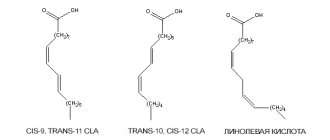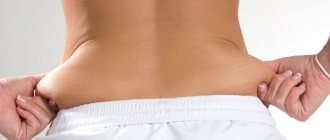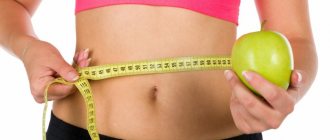In old age, many people believe that they can stop caring about a slim figure and their own weight. Concerns about appearance are no longer a motivation to curb appetite and avoid junk food. However, this is a fundamentally wrong position, because it is in old age that you should seriously think about losing weight and switching to proper nutrition.
This determines what your old age will be like and whether you have a chance to become a long-liver. If you are not tempted by the prospect of spending your entire pension on pharmacies and hospitals, if you want to remain vigorous, cheerful and active even after 70, then be sure to read this material to the end. In it are experts from the School of Nutritionists of the Wellness Consulting Academy
they will give 10 important tips that will help you maintain normal weight and lose weight in old age, and also tell you why you need it...
Why should older people lose weight and eat healthy?
The deteriorating environmental situation on the planet and the active use of various chemical additives in the food industry have led to the fact that today, at the age of 55-60, the health of most of us is far from ideal. This situation is significantly aggravated by excess weight and bad eating habits. Excess body weight and obesity aggravate the course of many chronic diseases and lead to the development of new ones.
Overweight people almost always have elevated levels of bad cholesterol in the blood, and are diagnosed with atherosclerosis, hypertension or other cardiovascular pathologies, which, if left untreated and controlled, can lead to a heart attack or stroke.
They also have a tendency to insulin resistance (prediabetes) due to carbohydrate and metabolic disorders. In the future, this promises the development of diabetes mellitus
the second type is an incurable disease that requires significant correction of nutrition and lifestyle in general.
Excess weight contributes to varicose veins and joint problems (arthritis, arthrosis, osteoarthritis, gout), as there is a lot of stress on the legs and knees, in particular. Walking for a long time becomes not only inconvenient, but also excruciatingly painful.
However, other problems with the musculoskeletal system are often diagnosed, for example, osteochondrosis and decreased bone mass due to a sedentary lifestyle and an unbalanced diet. The latter often causes osteoporosis, a disease that in its acute form confines a person to bed and greatly reduces his motor activity. In this case, to alleviate the condition, special therapeutic nutrition
.
Due to excess fat mass in the body, obesity of internal organs occurs when they literally become overgrown with fat and, accordingly, stop working normally. This applies to the heart, liver, kidneys, stomach and pancreas.
An unhealthy diet and regular overeating also affect the activity of the intestine: its peristalsis is disrupted, which causes chronic constipation, and then hemorrhoids.
Accumulations of abdominal fat put a lot of pressure on the diaphragm, and this burdens the lungs and makes breathing difficult. As a result, obese people are much more likely to experience bronchitis and pneumonia, develop pulmonary failure and asthma.
Now imagine that one person can have the entire list of diseases listed above. In old age, this is an unbearable test that turns an ordinary pensioner into a disabled person. Don't want to let this happen? Then take advantage of the recommendations of Lara Serebryanskaya’s school of nutritionists regarding weight loss in old age...
Comments from nutritionists
The nutrition of a woman after 50 years requires adherence to certain rules. According to nutritionists, during special nutrition, women during menopause need to take additional vitamin complexes. This is due to the fact that even at first glance, adequate nutrition during menopause is not able to fully provide a woman’s body with all the necessary microelements, nutrients and vitamins. The skeletal system especially suffers due to the leaching of calcium from the bones against the background of hormonal changes, which must be taken into account when selecting vitamin complexes. It is recommended to consult your doctor with any questions.
Tip #1. Follow your diet strictly
Without this, absolutely nothing will work. Elderly people, just like children, should eat according to a specific regimen without significant deviations. This will allow you to control your metabolism, improve the functioning of the gastrointestinal tract and accustom them to activity at certain hours.
To lose weight, you will have to eat 5-6 times a day in small portions. This way you won’t put too much strain on your stomach and pancreas, because smaller amounts of food are easier to digest and better absorbed. This diet will also help curb hunger and help solve the problem of regular overeating or eating disorders.
– the most common causes of excess weight.
Organize 3 main meals and 2 snacks between breakfast and lunch, lunch and dinner. In the first half of the day, eat high-calorie dishes from the menu so that the body has time to spend the energy received. After 15:00 you should eat foods with less calories.
Fractional meals will speed up your metabolism as much as possible, and this has a beneficial effect on weight correction. And remember one more important rule: don’t overeat at night. Overeating before bed has a bad effect on the figure and functioning of the gastrointestinal tract, and also contributes to insomnia, which is already a serious problem in old age.
Do you want to know how to easily fall asleep and have a great night's sleep, forgetting about insomnia? Then watch this video with nutritionist Lara Serebryanskaya:
Reviews
There are a lot of stories and reviews on the Internet from women who decided to lose excess weight after fifty years. Recently, more and more representatives of the older generation are taking it upon themselves to get their bodies in order. They begin to lose weight at 50, 57, and 65. Such women prove by their example that it is never too late to start taking care of yourself, and everything will definitely work out. Positive reviews about weight loss systems can be used as a motivator. However, you should not blindly follow the proposed methods. It is better to visit a weight loss specialist.
Tip #2. Reduce caloric intake by 25%
With age, the body's energy needs decrease, physical activity decreases, and metabolism slows down. If you do not reduce (reduce) the calorie intake, then excess weight will be gained very easily and quickly.
To maintain a healthy body weight or lose weight, your daily calorie intake should be reduced by about 25%. This will create comfortable conditions for weight correction, since it is especially dangerous for older people to be on various restrictive diets.
Why do women gain weight during menopause?
Weight gain during menopause is associated with three reasons:
- Hormonal changes. At the age of 45 to 50 years, the level of estrogen, responsible for the general tone and metabolic processes in the female body, decreases. This entails hormonal changes. Metabolism involuntarily deteriorates. This means that only a third of the food you eat will now be converted into energy. The rest goes to fat reserves.
- An attempt to stabilize hormonal levels. Since a decrease in estrogen levels is an unexpected and stressful phenomenon for the body, against the background of a failure, it begins to look for an opportunity to obtain these hormones in other ways. And since fatty tissue can also produce estrogens, the body accumulates this in an attempt to balance the hormonal system. You end up with extra pounds and weight gain. That is why sometimes during this period some women can lose weight with the help of hormones selected by a specialist.
- Overeating due to stress. During menopause, women often experience hormonal mood swings. They either fall into depression, then withdraw into themselves, or become incredibly apathetic, depriving themselves of walks and other physical activity. In addition, ladies often eat up their worries with a large amount of sweets and other junk food. Hello there, overweight.
Tip #4. Eliminate hydrogenated fats and reduce saturated lipids
Reducing the amount of animal fats in favor of plant and polyunsaturated fatty acids for an elderly person is no longer a recommendation, but a necessity.
Not only do saturated lipids and trans fats contribute to excess weight gain, but they also increase the level of bad cholesterol in the blood, and this leads to the development of such a serious disease as atherosclerosis (partial or complete blockage of blood vessels and arteries with cholesterol plaques).
The consequences of atherosclerosis are heart attacks and strokes, which for an elderly person often result in death or lead to disability. If you have already been diagnosed with this, then you urgently need to review your diet. For a while, it is better to switch to a vegetarian diet altogether, leaving only foods with vegetable fats and omega-3 fatty acids on the menu.
By the way, the latter help reduce the level of bad cholesterol in the blood and stop the formation of new atherosclerotic plaques. You can find omega-3 in nuts, unrefined vegetable oil, fatty fish and seafood, avocados and olives, seeds and seeds (flaxseed, sesame).
Remember that you cannot completely remove fats from your diet, as this contributes to hormonal imbalances and leads to skin and hair problems. We talk in detail about the importance and correlation of different types of fats during training at our school of dietetics.
To limit animal fats in your menu, do the following:
- include fish and lean meats (chicken and turkey fillets, quail, veal, rabbit) in your diet, and remove pork, beef, lamb, duck and goose;
- eat only low-fat dairy and fermented milk products;
- instead of hard and processed cheeses, use rennet varieties;
- reduce the amount of egg yolks.
- remove from your diet mayonnaise, margarine, spread and all other products that contain hydrogenated fats (store-bought cakes and pastries, processed foods, fast food, etc.).
Exercises
To increase efficiency, you should add sports to your daily life. Every day in the morning it is recommended to do exercises at home.
With a sedentary lifestyle, exercises are additionally performed in between work or traditional household chores.
When performing any exercise, it is important to breathe properly. Holding your breath is prohibited. Proper breathing helps provide cells and tissues with oxygen and helps you lose weight.
Aerobics and other physical activity
To speed up the process of burning fat, you should use aerobic exercise or, as they are also called, cardio. They are the most effective and provide quick results. This category includes race walking, fitness, swimming, running, orbital steps, and cycling.
When performing such exercises, almost all muscle groups work. As a result, blood circulation improves and fat deposits are burned.
30 minutes of such intense exercise burns 600 calories. You can lose over a thousand calories in an hour.
In addition to cardio exercise, it is recommended to do yoga and Pilates. These methods help you lose weight.
Strength exercises
Strength training is used to give the body a beautiful shape, burn calories and increase muscle mass. You don't have to lift a heavy barbell to do this. Moreover, this is not recommended. Significant weight puts stress on the back, bones, and joints.
At the initial stage, it is recommended to perform exercises with your own weight. They are the most effective. To do this, push-ups, the so-called “plank”, etc. are performed. You can also use dumbbells or weights.
Special exercises
After 50 years, the most problematic areas for women are the stomach, sides and legs. It is in these areas that they would like to get rid of fat and the so-called “orange peel”, or cellulite. Separate exercises have been developed specifically for these zones, which allow you to quickly restore tone and shape.
Slimming belly
The most problematic area is the stomach. This is the hardest part to get rid of. However, throwing all your energy into doing exercises only for this area is futile. Results can only be achieved with an integrated approach.
To get rid of belly fat, you can do the following exercises at home:
- Leg lift. It is advisable to perform the exercise on a horizontal bar or wall bars. The body should be in an upright position. Next, the legs are raised at an angle of 90 degrees. The exercise is repeated 10 times. The minimum number of approaches is 3. If there is no horizontal bar, the exercise can be performed lying on your back.
- Lifting the body. This is a standard abdominal exercise. When performing it, you need to take a position - lying on the floor on your back. Legs are bent at the knees. The body rises towards the legs. It is important to ensure that your lower back does not leave the floor while lifting. 10 times, 3 approaches.
- Plank. The position resembles the position a person takes when doing push-ups. There is no need to bend your arms while performing the exercise. You need to stay in this position as much as possible. You should start with 1 minute. The exercise not only tightens the stomach, but also strengthens the back muscles.
You can do crunches for the obliques. The exercises are similar to lifting the body. When performed, a rotation of the body in one direction or the other is added.
The main thing is to perform all the exercises correctly and without haste.
Slimming legs
To eliminate cellulite and tighten the skin on the legs, perform the following exercises:
- Lunges forward and backward on the right and left leg. Each exercise is performed 10 times. 3 approaches.
- Squats. You can start with 3 sets of 50 reps. Next, you can additionally add dumbbells or a barbell. This way you can achieve greater efficiency.
- Swing your legs. In a standing position, support on one leg. The second one is pulled back and comes back. You should start with 10 times in 3 approaches on each leg.
An orbit track and an exercise bike also help tighten your legs.
Tip #5. Switch to light proteins
Proteins are generally difficult for our body to digest, and even more so in old age. Therefore, all proteins that are difficult to digest should be replaced with light ones: lean meat, fish, egg whites, low-fat dairy products, vegetable proteins from nuts and cereals.
The daily protein requirement for people over 60 years of age is approximately 0.8-1 g per kilogram of body weight. Do not neglect compliance with this norm, since proteins are needed to maintain muscle mass, which decreases with age.
When there is not enough protein, muscles become flabby, which increases the risk of muscle tension, leading to pinched nerves. And if a person is diagnosed with osteoporosis of the lumbar region, then a weak muscle corset only intensifies the characteristic back pain.
Expert opinion
Many women dread menopause for fear of gaining weight. Some begin to exhaust their own body with strict diets, which is fundamentally wrong. By creating a calorie deficit, the body begins to experience enormous stress, which makes the situation even more difficult. But leaving everything to chance is also not good, since with excess weight other unpleasant diseases develop.
Our advice is to develop healthy eating behavior, devote time to physical activity and look at the world with different eyes. Psychologists can help with the latter, convincing you that your appearance and health largely depend on you.
Tip #6. Limit your intake of sweets and other simple carbohydrates
They contribute to rapid weight gain, reduce insulin resistance and increase the risk of developing type 2 diabetes. Simple carbohydrates must be replaced with complex ones: whole grain cereals and pasta, vegetables and fruits, legumes (be careful with the latter, as they contain coarse fiber, which is difficult for the stomach to digest).
It is worth noting that complex carbohydrates of plant origin include dietary fiber, which improves intestinal motility and helps solve the problem of chronic constipation, which is common among older people. They satiate perfectly and for a long time, helping to control hunger and avoid unnecessary overeating.
Cooking methods
Preference should be given to fresh fruits, vegetables, and herbs. You can eat them as part of fruit salads, seasoned with low-fat yogurt, vegetable salads, flavored with any vegetable oil. It is useful to drink juices made from fruits, berries, and vegetables listed earlier.
The best way to cook food is boiling, steaming, baking and grilling. It is necessary to exclude such heat treatment options as frying in oil and especially deep-frying. It is advisable not to prepare food for future use, but to consume it immediately after preparation.
It is important that nutrition during menopause is balanced and contains sufficient amounts of vitamins, macro- and microelements.
Tip #7. Keep drinking regime
With age, this is especially important, since the skin loses its former elasticity, wrinkles appear, the blood begins to thicken and flows through the vessels worse. Proper drinking regimen allows you to avoid dehydration, improves skin condition, removes toxins and waste, thins the blood, reducing the risk of thrombosis.
Therefore, elderly people need to drink at least 1.5 liters of non-carbonated purified water per day. Moreover, you need to do this, even if you don’t really want to (over the years, people feel thirst worse).
Tip #8: Reduce the amount of sugar and salt in your diet
Sugar is a simple carbohydrate that contributes to weight gain. Excessive consumption can disrupt carbohydrate metabolism and lead to the development of insulin resistance.
And salt, as you know, retains fluid in the body. Therefore, if you eat a lot of it (more than 10 g per day), edema will appear and blood pressure will increase, which for hypertensive patients is fraught with a hypertensive crisis. Salt is also harmful for people with diseased joints, as it is deposited in them and reduces their mobility.
It is advisable to eat no more than 5-7 g of sodium chlorine per day. For this:
- limit or completely eliminate pickled and canned foods;
- give up salty snacks (chips, salted crackers and nuts);
- do not use marinades, store-bought sauces and ketchups, processed foods, fast food, soy sauce, and salted fish.








